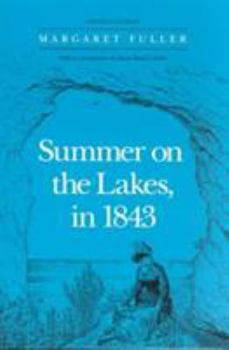Summer on the Lakes, in 1843
Select Format
Select Condition 
Book Overview
This work has been selected by scholars as being culturally important, and is part of the knowledge base of civilization as we know it. This work was reproduced from the original artifact, and remains... This description may be from another edition of this product.
Format:Paperback
Language:English
ISBN:0252061640
ISBN13:9780252061646
Release Date:December 1990
Publisher:University of Illinois Press
Length:192 Pages
Weight:0.68 lbs.
Dimensions:0.6" x 6.0" x 9.0"
Customer Reviews
1 rating
Enjoy a trip to the Midwest of the past
Published by Thriftbooks.com User , 21 years ago
Many American literature textbooks cover the topic of Transcendentalism with selections from just Emerson and Thoreau. Why they don't include some of the essays of Margaret Fuller is a mystery, especially in our current age of political correctness and emphasis on diversity. She provides a woman's opinion of life in general and of the landscape and people of the Midwest in particular in this, her first published book._Summer on the Lakes, in 1843_ is first and foremost a travelogue of Fuller's tour of the Midwest, and we follow her to Chicago and Milwaukee and into rural Michigan, Illinois, and Wisconsin. Her trip not only predates her friends' visits to the same area (Emerson first came through by stagecoach in 1850, and Thoreau took the train in 1861) but it also offers more observations about the people and the living conditions out on the prairie. Fuller had more time to spend roaming and adventuring, and she seems to have been more interested in the local culture than the men later were. (Or perhaps Emerson and Thoreau figured that Margaret Fuller had already provided the world with descriptions of the region, so they need not bother.) Midwestern readers should particularly enjoy the historic look at familiar landscapes, written at a time when white settlements were just beginning to congeal and take hold.Secondarily, Fuller focuses much of her writing on the plight of American Indians and also of women in general. She had read a great deal about the native people and seems disappointed to find that most of the Black Hawk War survivors had already moved west by the time of her visit. She also points a critical eye to the fate of the members of her gender who were helping to eke out a living on the prairie: "The great drawback upon the lives of these settlers, at present, is the unfitness of the women for their new lot." ... All domestic labor "must often be performed, sick or well, by the mother and daughters, to whom a city education has imparted neither the strength nor skill now demanded." (p. 38) And yet, many of the people she meets seem to be happy; and while life is hard and without most amenities, entertainment (even the occasional piano!) and merriment can abound.The narrative tends to languish when Fuller digresses into long-winded stories of the plights of specific women she either knew personally or heard about second- or even thirdhand. While these plot interruptions get tedious to the casual reader, they are further glimpses of feminine life in the early 19th century. Seen in that light, they can provide interesting diversions to the travelogue.Original illustrations by Fuller's traveling companion, Sarah Ann Clarke (sister of James Freeman Clarke) augment the text. This edition's introduction by Susan Belasco Smith helps to bring perspective to the trip and the writing. Recommended especially for residents of northern Illinois and to anyone interested in Midwestern history, transcendentalism, or women's studies. [This reviewe





